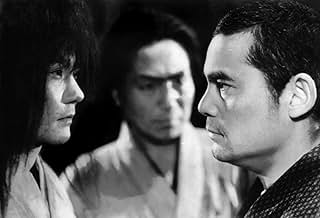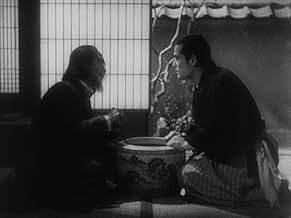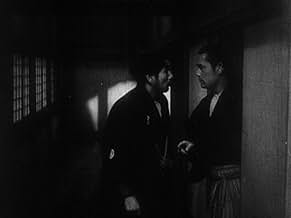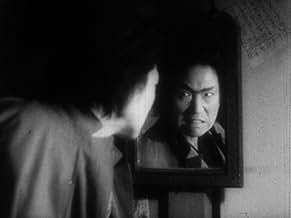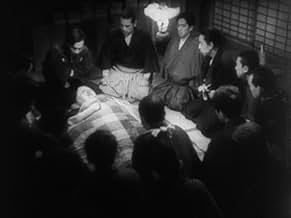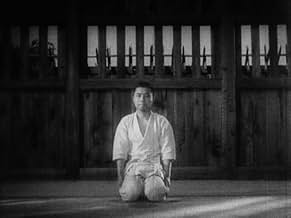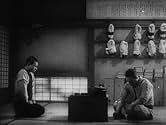Kô Ishida
- Daisuburo Hidarimonji
- (as Ko Ishida)
Osman Yusuf
- American Sailor
- (as Osman Yusef)
- Director
- Writers
- All cast & crew
- Production, box office & more at IMDbPro
Featured reviews
Due to its anti-American content, this film was never released in the US. Released in late 1945, in the early days of the American occupation of Japan, the movie has a strong anti-American slant. One of the two parallel plots of the film involves the young judo hero, Chee, and his battle to preserve the sanctity of the Japanese arts against the encroaching, brutish influence of American boxing. Americans are portrayed as a bunch of creeps. Eventually, Chee vanquishes the American champion to the wild cheers of his countrymen. This is by far the most interesting material in the film.
The judo vs boxing plot runs alongside a more pedestrian story: Chee is challenged by the brother of the karate master he vanquished at the finale of the original film. This story is a virtual carbon copy of the original, but with few of the original's charming nuances. The climactic final battle -- which takes place on a snow-covered moutainside -- is a pale imitation of the original's finale, which took place in a field of high grass.
The film also suffers from some of the same choppiness and fuzziness of narrative line that affected the original film, and a few other of Kurosawa's early works. Still, it's an entertaining effort. And it's remarkable as one of only two sequels Kurosawa ever filmed (the other being SANJURO, his follow-up to YOJIMBO). It appears Kurosawa learned from the experience of making SSP2 -- SANJURO is much more different from YOJIMBO than SSP2 is from its original, and a far more effective film than SSP2.
The judo vs boxing plot runs alongside a more pedestrian story: Chee is challenged by the brother of the karate master he vanquished at the finale of the original film. This story is a virtual carbon copy of the original, but with few of the original's charming nuances. The climactic final battle -- which takes place on a snow-covered moutainside -- is a pale imitation of the original's finale, which took place in a field of high grass.
The film also suffers from some of the same choppiness and fuzziness of narrative line that affected the original film, and a few other of Kurosawa's early works. Still, it's an entertaining effort. And it's remarkable as one of only two sequels Kurosawa ever filmed (the other being SANJURO, his follow-up to YOJIMBO). It appears Kurosawa learned from the experience of making SSP2 -- SANJURO is much more different from YOJIMBO than SSP2 is from its original, and a far more effective film than SSP2.
I searched for this film for many years after having seen and loved the original. After living in Japan for a while I came across a Japanese language version.
This movie was a great disappointment to me and I'm sorry to say that Donald Ritchie's observation that Akira did not seem to take this project seriously seems to hold true. It has none of the visual or dramatic impact of the first Sanshiro film leaving only a standard Japanese propaganda film with little in the way of new scenarios,characterization or concepts.
Unfortunately, even for fans like myself of Kurosawa this film is hardly worth watching.
This movie was a great disappointment to me and I'm sorry to say that Donald Ritchie's observation that Akira did not seem to take this project seriously seems to hold true. It has none of the visual or dramatic impact of the first Sanshiro film leaving only a standard Japanese propaganda film with little in the way of new scenarios,characterization or concepts.
Unfortunately, even for fans like myself of Kurosawa this film is hardly worth watching.
Akira Kurosawa's third film, released a year after The Most Beautiful (which he made for his wife) (actually, if it weren't for the lousy search function of Douban, there'd be no need to repeat this sort of objective reality in a review).
Akira Kurosawa himself, in his autobiography "Toad's Oil", doesn't seem to recognize much of the cinematic value of this "sequel to Zizan Sanshiro", which coincides with the popular aesthetic, the biggest criticism being the lyrical patriotism, similar to that in the modern-day Ip Man, an element that was loathed in the movies 60 years ago, and is still the case 60 years later. It's just obvious that the director, who has influenced Western cinema many times over in terms of casting and dramatization, naturally has his own insights. In the "Zi San Shiro sequel" will rarely see so involved, Kurosawa has shot, so low mobilization of nerves of film and television subject matter, at this point, I think the domestic film and television industry is still worth looking back at history to learn.
But the master is a master, after all, in the "Zi San Shiro sequel" we did not see colorful on that bad bridge too much continuation, but is point to the end, in the end oriented to the benevolence of the evil of revenge on the ending. It's as if when countless critics were giddy as if they were watching this talented Japanese director have some cracks in him, Akira Kurosawa once again backtracked on the theme of human kindness so that his early style wouldn't be so clearly labeled as patriotic.
Even now, as a director who has just made two movies, in his early work has revealed extremely artistic light and composition, in dealing with multiple people standing, not only makes people wonder if Antonioni has come here to steal the division.
Akira Kurosawa himself, in his autobiography "Toad's Oil", doesn't seem to recognize much of the cinematic value of this "sequel to Zizan Sanshiro", which coincides with the popular aesthetic, the biggest criticism being the lyrical patriotism, similar to that in the modern-day Ip Man, an element that was loathed in the movies 60 years ago, and is still the case 60 years later. It's just obvious that the director, who has influenced Western cinema many times over in terms of casting and dramatization, naturally has his own insights. In the "Zi San Shiro sequel" will rarely see so involved, Kurosawa has shot, so low mobilization of nerves of film and television subject matter, at this point, I think the domestic film and television industry is still worth looking back at history to learn.
But the master is a master, after all, in the "Zi San Shiro sequel" we did not see colorful on that bad bridge too much continuation, but is point to the end, in the end oriented to the benevolence of the evil of revenge on the ending. It's as if when countless critics were giddy as if they were watching this talented Japanese director have some cracks in him, Akira Kurosawa once again backtracked on the theme of human kindness so that his early style wouldn't be so clearly labeled as patriotic.
Even now, as a director who has just made two movies, in his early work has revealed extremely artistic light and composition, in dealing with multiple people standing, not only makes people wonder if Antonioni has come here to steal the division.
I have seen every Akira Kurosawa movie available on VHS or DVD and this is the first "bad" one among them. In fact, I will be so bold as to say I doubt he really directed it. His name is on the credits but I don't see a shred of him in the work. No environmentally framed shots, no contrasts of light and dark, no horizon dividing the frames. He must have done this one with a week of shooting time or a budget of 50 Yen. The comical fight between the Judo stylist and Karate stylist literally made me laugh out loud. It looked like parody. Nothing like the climatic fight in the first Sugata Sanshiro. Also the subtitles were apparently done by someone in China who could speak a little Japanese and a little English. They use the word "karate" for both karate and judo, and since the main conflict is between the two styles, you'd better pay attention to who's doing the the talking or you'll never follow the plot. The movie just about "braked" me.
I ended my recent review of "Sanshiro Sugata" by a sneaky remark. I alleged that the lead actor Susumu Fujita was no Toshiro Mifune... and I wish I could have found a more pleasant way to put it.
Now, let me reformulate. As true as it might be that Fujita doesn't have the same range, charisma or 'magnitude' than international icon Mifune, it is as unfair as comparing Harry Carey Jr. To John Wayne. And after that weird and rather corny opening, his appearance was quite a welcome sight. Indeed, something about the first minutes of the sequel of "Sanshiro Siguta" (which I prefer to refer to as "The Legend of the Great Judo") really set me off. The drunken Yankee sailor (played by Osman Yusuf!) kept blabbering some American slang with a rather convincing accent but the rickshaw was playing it it (no pun intended) as if he was playing in a Mac Senntt film.
Fujita's entrance changes the tone. He looks stern, menacing, and oddly intimidating. The confrontation did not leave much for suspense; it was obvious that for his opening fight scene would be an easy win. Still, whatever is wrong with the sequel has nothing to do with Fujita, who delivers a memorable performance as the young, idealistic and well-meaning martial arts student. It is a good thing because Siguta is in such a perpetual self-doubt that his quest could have taken a trilogy. I doubt it would have helped Kurosawa's career and I am sure he was more than glad to change this after the war. Therefore, at the end Siguta reaches his personal nirvana after Kurosawa stretched his arc as far as he could.
For the rest, it takes a while for the film to find its tone as it keeps being entangled in the necessity to make a point about the art of judo's superiority over boxing, the decadent export of US. Apparently Kurosawa was somewhat forced into making the film a propaganda by underlining without any attempt at subtitlity that boxing incarnates a failure of civilization that is so opposed to the quest of Judo... but for that, Americans are barely present and are replaced by a Japanese manager who's a caricatural sellout. While the film is by no means mediocre, it is not the master's finest hour and you can tell that if it wasn't for that propaganda subtext, it could have made for a better experience. It doesn't help that the image and sound quality (obviously not restored) make it difficult to appreciate.
Now the film is slightly better when it makes connections with the previous one and shows Sigita struggling to forgive himself for the death of Yono's father (played by Shimura in the first film) and when all of sudden, two strange long-haired characters who look like coming from a fantasy horror film and with expressionnist shadows decide to come to revenge their brothers, leading to a climax set in the snow-covered mountains. Iy is so magnificent you'd think it was borrowed from another film... and come way too late in the film.
Overall, it is a decent film but, the result is so beneath the standards of excellence of Kurosawa and of intelligence, that it will probably satisfy some history buffs looking for expressions of propaganda Japanese film and naturally the completists. Apart from that, it is a warmup before Toshiro Mifune who was certainly the muse Kurosawa needed (with Shimura being the touchstone)
Now, let me reformulate. As true as it might be that Fujita doesn't have the same range, charisma or 'magnitude' than international icon Mifune, it is as unfair as comparing Harry Carey Jr. To John Wayne. And after that weird and rather corny opening, his appearance was quite a welcome sight. Indeed, something about the first minutes of the sequel of "Sanshiro Siguta" (which I prefer to refer to as "The Legend of the Great Judo") really set me off. The drunken Yankee sailor (played by Osman Yusuf!) kept blabbering some American slang with a rather convincing accent but the rickshaw was playing it it (no pun intended) as if he was playing in a Mac Senntt film.
Fujita's entrance changes the tone. He looks stern, menacing, and oddly intimidating. The confrontation did not leave much for suspense; it was obvious that for his opening fight scene would be an easy win. Still, whatever is wrong with the sequel has nothing to do with Fujita, who delivers a memorable performance as the young, idealistic and well-meaning martial arts student. It is a good thing because Siguta is in such a perpetual self-doubt that his quest could have taken a trilogy. I doubt it would have helped Kurosawa's career and I am sure he was more than glad to change this after the war. Therefore, at the end Siguta reaches his personal nirvana after Kurosawa stretched his arc as far as he could.
For the rest, it takes a while for the film to find its tone as it keeps being entangled in the necessity to make a point about the art of judo's superiority over boxing, the decadent export of US. Apparently Kurosawa was somewhat forced into making the film a propaganda by underlining without any attempt at subtitlity that boxing incarnates a failure of civilization that is so opposed to the quest of Judo... but for that, Americans are barely present and are replaced by a Japanese manager who's a caricatural sellout. While the film is by no means mediocre, it is not the master's finest hour and you can tell that if it wasn't for that propaganda subtext, it could have made for a better experience. It doesn't help that the image and sound quality (obviously not restored) make it difficult to appreciate.
Now the film is slightly better when it makes connections with the previous one and shows Sigita struggling to forgive himself for the death of Yono's father (played by Shimura in the first film) and when all of sudden, two strange long-haired characters who look like coming from a fantasy horror film and with expressionnist shadows decide to come to revenge their brothers, leading to a climax set in the snow-covered mountains. Iy is so magnificent you'd think it was borrowed from another film... and come way too late in the film.
Overall, it is a decent film but, the result is so beneath the standards of excellence of Kurosawa and of intelligence, that it will probably satisfy some history buffs looking for expressions of propaganda Japanese film and naturally the completists. Apart from that, it is a warmup before Toshiro Mifune who was certainly the muse Kurosawa needed (with Shimura being the touchstone)
Did you know
- TriviaThe final fight scene was filmed outdoors in real snow. Susumu Fujita, fighting barefoot, had to be carried to a bonfire between each shot as his feet would go numb.
- ConnectionsFollows Sanshiro Sugata (1943)
- How long is Sanshiro Sugata, Part Two?Powered by Alexa
Details
- Release date
- Country of origin
- Language
- Also known as
- Judo Saga II
- Filming locations
- Toho Studios, Tokyo, Japan(Studio)
- Production company
- See more company credits at IMDbPro
- Runtime
- 1h 23m(83 min)
- Color
- Sound mix
- Aspect ratio
- 1.37 : 1
Contribute to this page
Suggest an edit or add missing content

